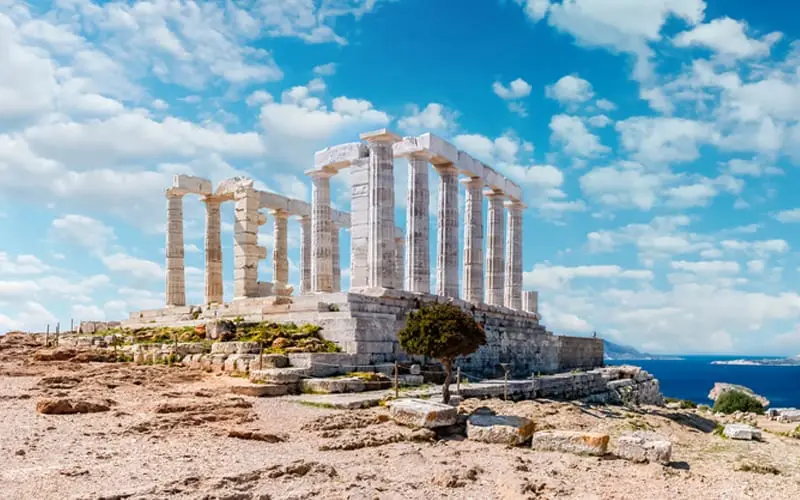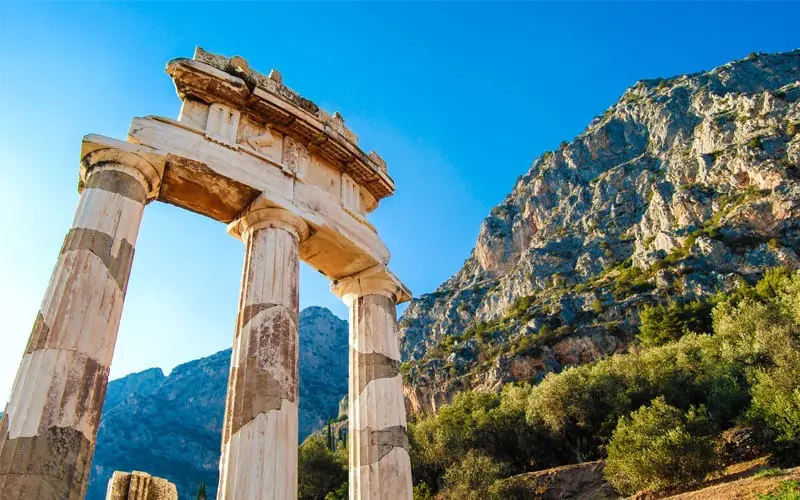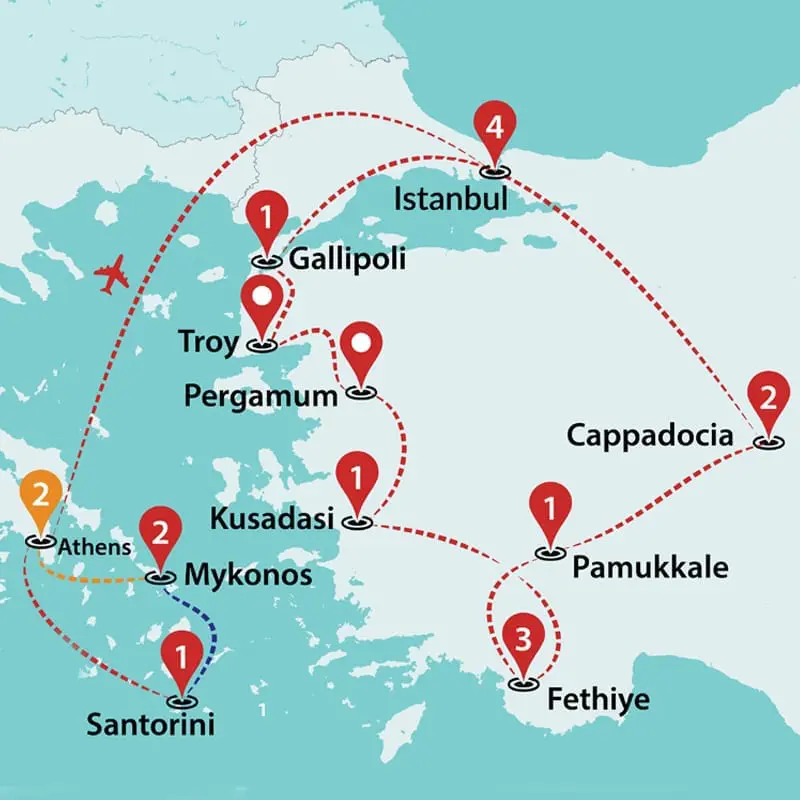Best Time To Visit Greece
The best time to visit Greece is May to September when the Greek islands are bustling with life, and the weather is perfect for enjoying the coast. Beginning in May, the warmth of the Mediterranean sun arrives on the islands. The balmy weather offers the perfect sailing trip, while the sea breeze makes the nights pleasant for enjoying music and cultural activities.
July and August are the busiest months, especially in popular islands such as Mykonos, Santorini, and Ios. Most cultural events take place around this time, and the country hosts the perfect beach weather. Around September and October, the temperatures are slightly lower, and the islands are less busy.
In winter, the weather in Athens is cold, and the islands are closed. Most trips to Greece start around April, so waiting for spring is recommended for the ultimate Greece experience.
Why You Should Visit Greece: Greece is a must-visit destination for those seeking breathtaking natural scenery, rich cultural history, and delicious cuisine. With its stunning islands, crystal-clear waters, and pristine beaches, Greece is a paradise for beach lovers and water sports enthusiasts. From the iconic Acropolis in Athens to the ancient ruins of Delphi, Greece is steeped in fascinating history, making it a perfect destination for history buffs. Whether you’re looking to explore the country’s stunning coastline or delve into its fascinating history and culture, Greece is an excellent choice for your next vacation.
Things to Consider: During peak season, Greece can be quite busy, so it’s important to book accommodations and transportation in advance. Additionally, familiarize yourself with the local customs and etiquette, such as appropriate dress when visiting religious sites or engaging with locals. Greek cuisine is a highlight of any trip, so be sure to try local dishes and delicacies, and seek out recommendations from locals or online resources. Finally, remember to pack appropriately for your activities, such as comfortable shoes for walking on uneven terrain and sunscreen for long days in the sun.
Montly Travel Guide For Greece
Travelling in Greece between April and June
Late April to June offers the perfect weather for Greece tours. Enjoying the beaches in the Greek islands and sightseeing in Athens is quite pleasant in springtime. The European holiday does not start until July, so it is the best time to visit Greece before the crowds arrive.
Greece celebrates easter around late April or early May, which offers an opportunity to experience the Greek culture while traveling in the popular attractions of the country.
By June, sea temperatures reach the perfect level in Santorini, Mykonos, and Ios. The weather is balmy, and nights are fresh due to the sea breeze. It is a perfect month to enjoy some quiet leisure time under the clear blue skies.

Travelling in Greece in July and August
July and August are the hottest months in Greece, with temperatures reaching 35°C and above. Summer is the peak season for Greece tours and a perfect time to enjoy the nightlife in the islands.
If you don’t mind the busy streets and beaches, July and August is the best time to visit Greece for sea activities and exploring the cultural attractions of Athens.

Travelling in Greece in September
September is the ideal month for having a more quiet time in the Greek islands. The warmth of summer lingers on, sea temperatures are ideal for swimming, and the beaches are less busy. It is also a good time for visiting the urban attractions in Athens without the heat and the crowds.

Travelling in Greece in October
The average temperature in the Greek islands is around 20°C, and they are open for visitors until the end of the month. Visiting the attractions in Athens and the islands becomes comfortable as the heat of summer leaves the country.
October is a wonderful month for enjoying the views of the changing landscape, as well as trying Greek cuisine and local wines.

Travelling in Greece between November and February
The Winter season in Greece is quiet and chilly. Temperatures range from 8 to 15°C, which is not the ideal beach weather. The islands are closed around this time, although the historic sites are open.

Greece Climate & Weather Guide
| Destination | Jan | Feb | Mar | Apr | May | Jun | Jul | Aug | Sep | Oct | Nov | Dec | ||
|---|---|---|---|---|---|---|---|---|---|---|---|---|---|---|
| Athens | 🔆 | 10°C | 10°C | 13°C | 16°C | 21°C | 26°C | 29°C | 29°C | 24°C | 20°C | 15°C | 12°C | |
| 🌧️ | 32 mm | 38 mm | 38 mm | 39 mm | 24 mm | 5 mm | 1 mm | 3 mm | 6 mm | 24 mm | 41 mm | 13 mm | ||
| ❄️ | – | – | – | – | – | – | – | – | – | – | – | – | ||
| Mykonos | 🔆 | 9°C | 9°C | 12°C | 15°C | 19°C | 23°C | 26°C | 25°C | 23°C | 19°C | 14°C | 10°C | |
| 🌧️ | 135 mm | 150 mm | 95 mm | 58 mm | 33 mm | 15 mm | 18 mm | 23 mm | 97 mm | 165 mm | 170 mm | 165 mm | ||
| ❄️ | – | – | – | – | – | – | – | – | – | – | – | – | ||
| Santorini | 🔆 | 12°C | 13°C | 14°C | 16°C | 21°C | 24°C | 26°C | 26°C | 24°C | 21°C | 17°C | 13°C | |
| 🌧️ | 70 mm | 43 mm | 40 mm | 16 mm | 11 mm | – | 7 mm | – | 11 mm | 38 mm | 59 mm | 75 mm | ||
| ❄️ | – | – | – | – | – | – | – | – | – | – | – | – | ||
| Ios | 🔆 | 11°C | 11°C | 13°C | 16°C | 20°C | 25°C | 27°C | 27°C | 24°C | 20°C | 16°C | 13°C | |
| 🌧️ | 65 mm | 65 mm | 50 mm | 20 mm | 15 mm | – | – | – | 5 mm | 30 mm | 60 mm | 90 mm | ||
| ❄️ | – | – | – | – | – | – | – | – | – | – | – | – | ||
| Delphi | 🔆 | 10°C | 11°C | 14°C | 18°C | 21°C | 26°C | 29°C | 30°C | 25°C | 20°C | 15°C | 11°C | |
| 🌧️ | – | – | – | – | – | – | – | – | 2 mm | 3 mm | – | – | ||
| ❄️ | – | – | – | – | – | – | – | – | – | – | – | – | ||
| Kalambaka | 🔆 | 7°C | 9°C | 12°C | 17°C | 22°C | 27°C | 31°C | 30°C | 26°C | 19°C | 13°C | 9°C | |
| 🌧️ | 90 mm | 100 mm | 85 mm | 75 mm | 60 mm | 40 mm | 25 mm | 25 mm | 55 mm | 80 mm | 100 mm | 110 mm | ||
| ❄️ | 2 mm | – | – | – | – | – | – | – | – | – | – | 1 mm | ||
| Thessaloniki | 🔆 | 6°C | 6°C | 10°C | 14°C | 18°C | 23°C | 26°C | 26°C | 22°C | 17°C | 11°C | 7°C | |
| 🌧️ | 30 mm | 60 mm | 50 mm | 50 mm | 40 mm | 30 mm | 30 mm | 20 mm | 20 mm | 50 mm | 80 mm | 50 mm | ||
| ❄️ | – | – | – | – | – | – | – | – | – | – | – | – |
When to visit Greece
Greece Island Hopping Tours in July-August
Athens host many cultural and traditional events in these months, all of which are open-air and perfect for filling your evening hours. Since it is the peak season, the historical attractions can be busy. But if you don’t mind the crowds, summer is the best time to visit Greece for cultural trips.
Summer is the peak season for island hopping tours, The hot weather is perfect for enjoying the comfort of sea travel, and the sparkling sea offers the best views. Beaches in the most famous islands of Greece are at their best for swimming and soaking up in the sun.
The luxury center Santorini is at its most vibrant time in these months. The nightlife is glamorous, hosting a variety of live events and famous DJs. Party life in Mykonos is slightly less epic, although the beach bars offer the most iconic island vibe. Our Best of Greece tour offers the ultimate island experience by taking you to each of these destinations along with Athens.
Tips for island-hopping in in Greece:
– Some islands are ideal for beaches and water sports, while others are better for hiking, sightseeing, or nightlife. So, do some research before you go.
– Island-hopping can be unpredictable, and schedules can change due to weather or other factors. Be prepared to be flexible.
– Island hopping usually involves a lot of traveling between islands and carrying your luggage. Pack light and bring comfortable shoes.
– Be respectful: Dress modestly when visiting churches and other religious sites.
Explore the Island Life in May-September
May and September are the shoulder seasons in Greece. The warm, balmy weather is perfect for exploring the volcanic landscape of Santorini with a walking tour, capture and savor the Mediterranean sunset in the islands, and learn about ancient Greek history in Mykonos.
Since it is less crowded in the shoulder season, witnessing the lives of locals in the island towns is much more comfortable. Athens is also a popular spot at this time of year, with temperatures varying around 25°C and the inter-season offering spectacular views for photography.
How to experience the local culture in the Greek Islands:
Taste Greek Cuisine
Greek food is an essential part of the culture, and each island has seasonal dishes perfect to try in the shoulder seasons.
In Santorini, try the famous cherry tomatoes, fava, and white eggplant. In Mykonos, try the louza (cured pork fillet) and kopanisti (spicy cheese). In Ios, try the traditional village bread and the local cheeses.
Attend Local Festivals
The Santorini International Music Festival takes place in September. In May, Mykonos celebrates the Feast of the Flowers.
Explore the Villages
In Santorini, visit the traditional villages of Oia, Fira, and Pyrgos. In Mykonos, explore the picturesque alleys of Chora. In Ios, take a hike to the ancient castle.
Visit Turkey & Greece in September
September is the best time to visit Greece and Turkey for the ultimate Mediterranean experience. The pleasantly warm weather of late summer is dominant across the islands and the Aegean coast of Turkey. As the heat of summer is gone, it is the ideal time for admiring natural sites in Pamukkale, Cappadocia, and the hot springs of Santorini.
The crowds leave both countries towards the end of August, making cultural trips in Athens and Istanbul comfortable. Our Greece & Turkey Discovered tour has the perfect itinerary for an in-depth exploration into the highlights of both countries.
Highlights of a combined trip to Greece and Turkey:
– Turkey and Greece are geographically close, making it easy to travel between the two countries.
– In Turkey, you can explore the famous Blue Mosque, Topkapi Palace, and the ancient city of Ephesus.
In Greece, you can visit the Acropolis in Athens, the stunning beaches of the Greek Islands, and the picturesque villages of Santorini and Mykonos.
– The two countries share some cultural similarities, such as their love of food and hospitality, but they also have unique traditions, architecture, and art.
– You can take your time exploring the sights and avoid the long queues in both countries in September.
Greece FAQ
What’s the best time to visit Greece for budget travellers?
The best time to visit Greece for budget travelers is during the shoulder seasons, including the months of April, May, and October. You can still enjoy the beaches and outdoor activities in April, May, and October, but you won’t have to contend with the large crowds and inflated prices that come with peak-season travel.
What is the hottest month in Greece?
The hottest month in Greece is typically August. During this month, temperatures can reach up to 35°C or higher in many parts of the country, particularly in the southern regions and the islands. July is also very hot, with temperatures ranging from 28°C to 33°C in most parts of Greece.
It’s important to note that the heat in Greece can be particularly intense during the summer months, especially if you’re not used to it. It’s essential to take precautions to protect yourself from the sun, such as wearing a hat, using sunscreen, and drinking plenty of water.
When is the most popular time to visit the Greek Islands?
The most popular time to visit the Greek Islands is during the peak summer months of June, July, and August. These months coincide with the high season for tourism in Greece, and as such, the islands are at their busiest during this time. It is a popular time to enjoy the beaches and the sea.
When is the best time to experience Greek culture?
The best time to experience Greek culture is during the shoulder seasons of May, June, September, and October, when the weather is still pleasant, and the crowds are thinner than during the peak summer months of July and August.
The crowds are smaller, making it easier to engage with locals and experience Greek culture firsthand. In June, the Athens and Epidaurus Festival takes place, featuring a variety of theater, music, and dance performances in ancient venues.
When is the least crowded time to visit Greece?
The least crowded time to visit Greece is during the low season, which runs from November through March. During these months, the weather can be cooler and less predictable, and many of the popular tourist attractions and services may be closed or have reduced hours. To experience Greece to the fullest with fewer crowds, the best time to visit is during the shoulder season of spring and early autumn.
How many days do you need to visit Greece?
For those looking to explore Athens and its surrounding areas, a minimum of 3-4 days is recommended. To experience the islands, it is suggested to dedicate at least 5-7 days to visit two or three of them, though for those who want to experience more islands or have a more relaxed pace, 10-14 days is ideal. Those who want to combine island hopping with mainland sightseeing can plan for a 10-14 day itinerary that includes Athens, the Peloponnese region, and the Greek islands.
What is the coldest month in Greece?
The coldest month in Greece is typically January, although the exact temperatures can vary depending on the region. In Athens, for example, the average temperature in January is around 10°C (50°F), while in northern Greece, temperatures can drop below freezing, and snowfall is not uncommon. However, even during the winter months, Greece can be a great destination for travelers who enjoy cooler weather and fewer crowds.
What are the best cities to visit in Greece?
Athens – The capital city of Greece is home to the iconic Acropolis and Parthenon, as well as many other historic sites and museums. Thessaloniki – This vibrant city in northern Greece is known for its lively nightlife, delicious food, and stunning Byzantine architecture. Nafplio – This coastal city in the Peloponnese region is known for its stunning architecture, scenic streets, and historic fortress. Corfu Town – The capital city of the island of Corfu is a UNESCO World Heritage Site, with a beautiful old town, historic fortresses, and Venetian architecture. Heraklion – The largest city on the island of Crete, Heraklion is home to the fascinating Archaeological Museum, as well as the ancient Palace of Knossos.
Is it safe to travel to Greece?
Greece is generally considered a safe destination for travelers. The country has a low crime rate, and violent crime is rare. However, as with any travel destination, it is always important to take basic precautions to ensure your safety. Be aware of your surroundings, especially in crowded areas such as public transportation or popular tourist sites. Keep your valuables secure, such as by using a money belt or locking your belongings in a safe.
What are the most beautiful places in Greece?
Santorini – This island in the Cyclades is known for its picturesque white-washed buildings, blue-domed churches, and breathtaking sunsets. Meteora – These towering rock formations in central Greece are home to ancient monasteries, offering spectacular views and a glimpse into the country’s religious history. Mykonos – This island in the Cyclades is known for its vibrant nightlife, beautiful beaches, and iconic windmills. Corfu – This lush island in the Ionian Sea is home to stunning beaches, charming villages, and a rich cultural heritage.
Does Greece have nightlife?
Greece is known for its vibrant nightlife, especially in the major cities and popular tourist destinations. Athens, Thessaloniki, Mykonos, and Santorini are all known for their lively nightlife scenes, with a variety of bars, clubs, and restaurants to suit all tastes. In the summer months, many beach clubs and outdoor venues offer live music and DJs, while in the winter, the cities come alive with indoor parties and events. Greek nightlife typically starts late, with many clubs not opening until midnight or later and staying open until the early morning hours.
Which airlines fly directly into Greece?
Many airlines offer direct flights to Greece from cities around the world, including Europe, the Middle East, and North America. Here are some of the major airlines that offer direct flights to Greece: Aegean Airlines, Olympic Air, Ryanair, easyJet, Emirates, Qatar Airways, Delta Air Lines.
What to wear in Greece?
Choose lightweight and breathable fabrics such as cotton, linen, and rayon to help keep you cool in the hot summer weather. You’ll likely do a lot of walking in Greece, so bring comfortable shoes that are suitable for both urban and outdoor environments, such as sandals, sneakers, or sturdy walking shoes. You’ll likely do a lot of walking in Greece, so bring comfortable shoes that are suitable for both urban and outdoor environments, such as sandals, sneakers, or sturdy walking shoes.
Greece can be very sunny, especially in the summer months, so be sure to pack sunscreen, a hat, and sunglasses to protect yourself from the sun. If you plan to visit churches or other religious sites, be sure to dress modestly, covering your shoulders and knees.
What is Greece famous for?
Ancient Greek civilization – Greece is the birthplace of Western civilization and the ancient Greeks made significant contributions to philosophy, art, literature, and science.
Beautiful beaches – Greece is home to some of the most beautiful beaches in the world, with crystal-clear waters and stunning scenery.
Delicious food – Greek cuisine is known for its fresh and flavorful ingredients, including feta cheese, olives, seafood, and grilled meats.
Mythology – Greek mythology has had a significant impact on Western culture, with stories of gods and goddesses such as Zeus, Athena, and Aphrodite.
What is the best time to eat delicious food in Greece?
The best time of year to enjoy delicious food in Greece is during the summer months from June to September. This is when many of the local fruits and vegetables are in season, including tomatoes, cucumbers, eggplant, peppers, and watermelon, making for fresh and flavorful dishes. The warm weather also means that seafood is abundant, with many restaurants offering grilled fish and octopus. In addition, many local festivals and celebrations take place during the summer months, where you can sample traditional Greek cuisine and delicacies such as souvlaki, moussaka, and spanakopita.
Do you need a visa to visit Greece?
Whether you need a visa to visit Greece depends on your nationality and the purpose and duration of your stay.
Citizens of the European Union (EU), European Economic Area (EEA), and Switzerland do not need a visa to enter Greece and can stay in the country for up to 90 days within a 180-day period.
Citizens of certain countries, including the United States, Canada, and Australia, can visit Greece for up to 90 days within a 180-day period without a visa for tourism or business purposes.
Greece by Season

Winter
The best time to stick with the inland and explore the ancient lands from Peloponnese to Athens. Unfortunately, the iconic islands of Greece are closed during most of the winter season. This gives you enough time to appreciate the historic landmarks of mainland Greece, like the Acropolis and the Parthenon.
Low season means fewer crowds, which is the perfect opportunity to revel in the local culture.
Best Things to do in Greece in winter:
Admire the snow-capped peaks of the ethereal rock pillars of Meteora. Try a cup of steaming Greek coffee.

Spring
The best time for a quiet getaway to the Greek Islands. Santorini, Mykonos, and Ios are just waking up from their winter slumber in late March, making it enjoyable for visits without the crowds.
Greek Easter is in April, a festive and important celebration in the local calendar. You will witness traditions and daily life at their liveliest time.
Best Things to do in Greece in spring:
Visit a Greek vineyard and taste the local wines. Take in the intoxicating smell of orange blossoms in the National Gardens of Athens.

Summer
Time to hit the glittering islands of the Mediterranean. Experience the lively nightlife of Mykonos or the serene beauty of Santorini. You will get to be a part of a thriving community in a buzzing entertainment scene.
Greece’s festivals scene is soaring from June to August. The most iconic ones are the Athens and Epidaurus Festival, Rockwave, and Kalamata International Dance Festival.
Best Things to do in Greece in summer:
Savor traditional Greek dishes like souvlaki, moussaka, Greek salad, and tzatziki, as well as indulge in sweet treats like baklava and loukoumades. Try windsurfing, kitesurfing, and parasailing in the azure waters.

Autumn
Harvest season in Greece creates some of the best sceneries you will experience throughout the year. The ancient lands are captivated by the odor of fresh produce in September, including figs, grapes, and olives.
Island-hopping in Greece is still a joyous activity with mild temperatures and fewer crowds. It is also an ideal time to learn about Ancient Greek history while visiting the ruins in Delphi, Athens, and Corinth.
Best Things to do in Greece in autumn:
Attend a food and wine festival in Athens. Observe local farmers in the traditional olive-picking ceremonies.
 December Sale; Save 50%
December Sale; Save 50%  Croatia Sailing : Save 50%
Croatia Sailing : Save 50% Asia Tours : 50% Off
Asia Tours : 50% Off Central & Eastern Europe Tours: 50% Off
Central & Eastern Europe Tours: 50% Off  Why Travel Talk
Why Travel Talk Travel Talk Blog
Travel Talk Blog Responsible Travel
Responsible Travel Fair Travels with Travel Talk
Fair Travels with Travel Talk




